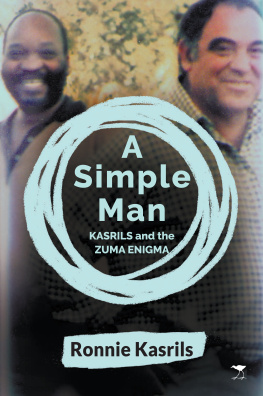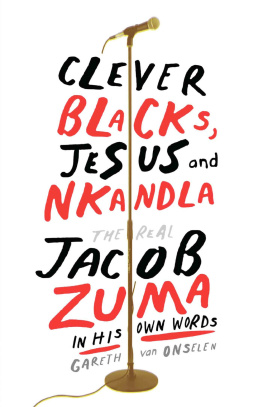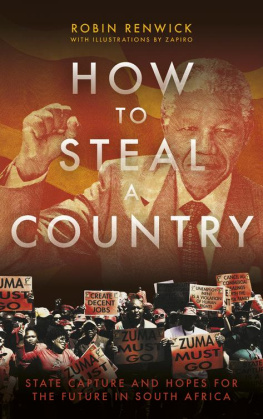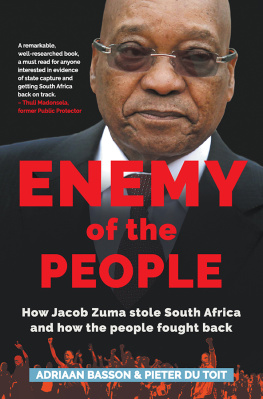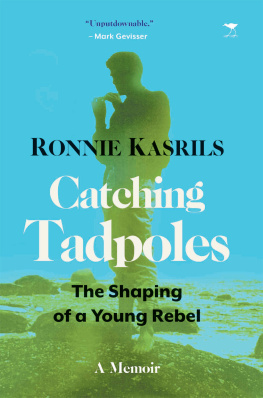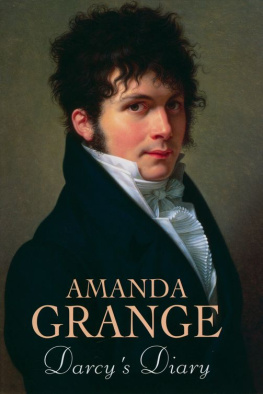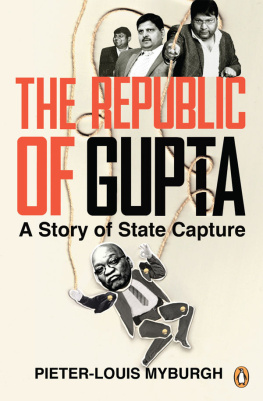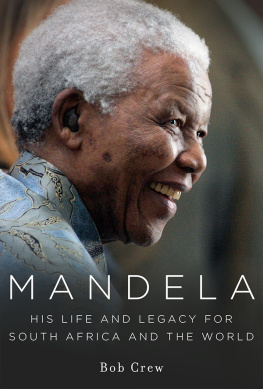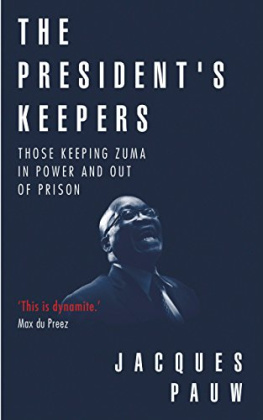All rights reserved.
Dedicated to the Man in the Green Blanket and the Girl in the Green Scarf Mgcineni Mambush Noki and Fezeka Kuzwayo who fearlessly stood their ground against power in the most corrupt of times
Little did we suspect that our people, when they got the chance, would be as corrupt as the apartheid regime.
The final disillusionment will come, of course, when the repressive apparatuses of the state turn their weapons on the masses to protect the interests of the capitalist class.
Foreword
T HIS IS THE STORY of the hidden death of a beloved African myth. It is a story told as only an insider could tell it. The meticulous detail makes it a unique record of how close comrades, having been involved in decades of struggle for an immensely ambitious project of transformation, once in power made political choices which enriched a new class at home, made state patronage and corruption a new norm, and in foreign policy frequently evaded principle. It reads like a thriller, with characters and happenings stranger than fiction and Shakespearean in depth. How did all this happen in full view of a world which mostly chose not to see?
South Africas freedom had been so long delayed, so hard won, so drenched in blood and sacrifice that at home and abroad people greeted it as a miracle which was going to change everything, not just at home, but in the standing of the continent in the wider world. The towering stature of Nelson Mandela alone was believed to be enough to ensure internal harmony for the future.
Many factors ended the dream of harmony. One of them, never so clearly illustrated, was the personal characteristics of some of the leadership from the outset. An opening scene here of a moment long ago in 1982 in the high-risk world of the clandestine armed struggle outside the countrys borders reveals the shadow of what was to come.
The authors response that night was a long private reflection, a questioning of his own responsibility, and a new ambivalence and wariness about his comrade traits which would carry him decades later to choose open collision rather than collusion with his old associate, whose own traits that night began to display that he was far from being a simple man of the people.
It was twenty-odd years after that night that the two contrasting visions of politics, revolution and morality it had foreshadowed came into the open, at least between party cadres though not yet before the country.
Ronnie Kasrils, in the years of underground work from London, Angola and Mozambique, and, later, on the run inside South Africa and then in the government ministries he headed, built teams of men and women cemented by mutual respect, which endured long after their inception. Principles for safeguarding the country from the abuse of power were regularly reiterated by him to his colleagues. Jacob Zuma, meanwhile, built patterns of personal patronage on ethnic ties, ruthlessly sacrificing valuable colleagues with a different profile. And the memorable womens parts in his story are not of trusted colleagues but of figures of tragedy: one of Zumas many wives who committed suicide and left a devastating note, and a young woman abused by a man she had known as her fathers comrade in the years of armed struggle, as Kasrils was too. She considered them her uncles. How telling it is that the first person she phoned after her traumatic experience with Zuma was Kasrils.
That occasion when she alleged rape and its aftermath form one strand of the complex tale of corruption and power dominance laid bare here. Against all evidence and logic Zuma, speaking in court only in his own dialect and invoking local cultural norms, won the rape case against him. Outside in the streets, vulgar displays of ANC male chauvinism and female adulation for Zuma shamed everything the party had stood for. The victim was treated like a medieval witch, and Kasrils was accused of involving her as a honey trap to harm Zumas career, as part of a conspiracy.
Other conspiracies, however, were all too real. Here is an extraordinary series of complex tales of real corruption, faked emails, leaked phone conversations, conmen and criminals, betrayals within the several intelligence services, laughable incompetence, and diligent forensic work by professionals. Only someone living deep inside this web could unravel the strands to show clearly what happened and how he was misled by his own staff, and defamed as a traitor by people who should have known better. Along the way there were many trials, many sentences, lies, defamation and, above all, confusion in peoples minds at all levels in the country. Good men and women made bad choices in good faith, he writes. The judiciarys role veered wildly between blatant partisan ruling and impeccable upholding of the rule of law. In this prepared atmosphere the ANC, backed by the SACP and the trade unions, removed the dignified, bookish president, Thabo Mbeki. Kasrils was among the ministers who went with him.
Jacob Zuma had won a thirty-year ambition. He and Ronnie Kasrils had been formed together over years in the ANC and SACP. But that night incident on the Mozambique border reveals the roots of Zumas turning away from party ideals onto a trajectory of linking power and money. The symbol would be his ostentatious spending on a rural mansion complex, which became a national scandal. Kasrils, whether in or out of party and power, lived modestly with the ideological choices forged by the international fraternity of the Cubans and others in the years of secrecy, disruption and discipline. Aesops fable says it all for the two of them: A man is known by the company he keeps.
Many academics and journalists have written from many angles on the southern African liberation movements incompetence and slide into corruption and repression once they were in power in their various countries. Exiles from other African countries have written bitter accounts of the failures of new post-independence regimes back home. Many are interesting, but limited in their contribution to understanding the processes of change that happened, seemingly mysteriously. A new generation deserves a key to understanding how a country can be brought low by structural factors and some legacies of exile and underground years steeped in paranoia and suspicion, combined with ruthless ambition to gain power at all costs and the hubris that could convince a man like Jacob Zuma that he was untouchable by the law. They have just such a key here.
It takes a brave and principled man to write openly of the unravelling world in which he was a key participant for so long. The myth of South Africas success became just a PR trick, which much of the world chose to swallow. Ronnie Kasrils has lived with the deepest of disappointments in the collective failure to keep faith with the millions of families living lives of shameful deprivation whom he and his colleagues risked their lives for over and over again in the hopeful armed struggle years. The defeat has many external factors the socio-economic environment and multinational corporate and political power as well as the weakness or self-interest of so many colleagues who chose to follow the siren song of Jacob Zuma on the road to personal power, status and ostentatious wealth over the interest of the countrys masses.

